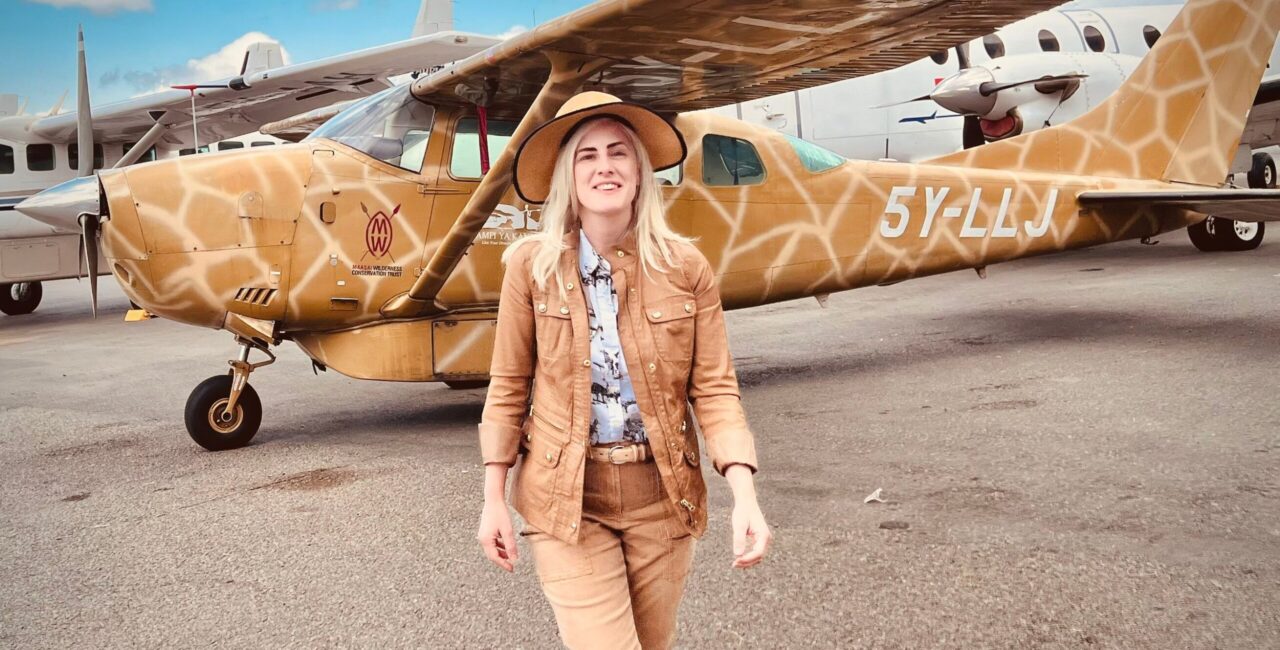
International Studies director explores connections in Africa
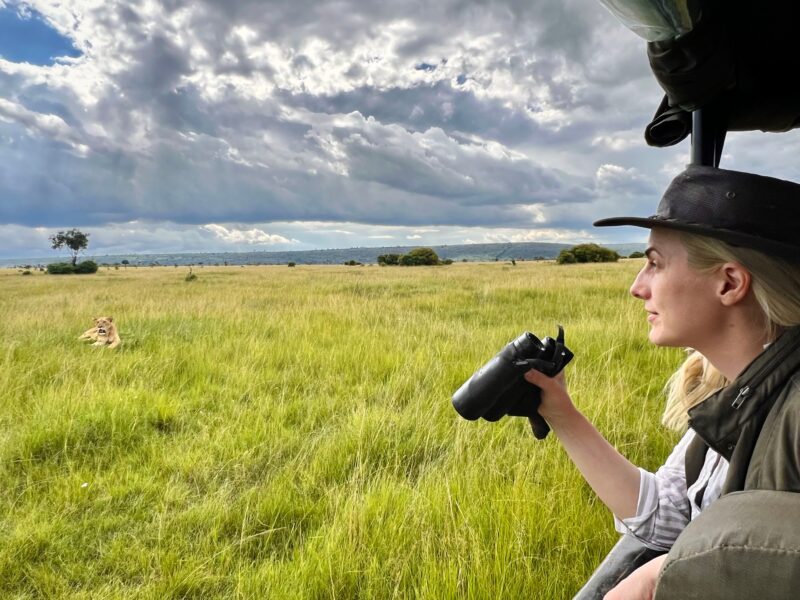
Assistant Professor of History Dr. Christiane-Marie Abu Sarah, who joined the Erskine College faculty in 2020, spent a meaningful month in Africa shortly after the close of Erskine’s 2024 spring semester. In addition to hiking, bird-watching, and going on safari—all rewarding activities—she scoped out some possible connections for the International Studies Program she directs and stored away knowledge and experiences to share with her students.
Abu Sarah and her husband Aziz traveled to Kenya, Rwanda, South Africa, and Tanzania, and the timing of their trip was perfect, a few weeks before the late-June start of the peak tourist season. “By going late in May, we were able to avoid high season, but still enjoy the start of the Great Migration as herds of zebra, wildebeest, and gazelle move through the Serengeti into Maasi Mara in Kenya.”
Taking in the natural beauty of Africa was a thrilling experience, whether by hiking in Volcanoes National Park in Rwanda, watching the penguins on the southern cape in South Africa, or going on safari in Kenya.
“Many countries inspire you to marvel at creation,” Abu Sarah says, “but there is something especially breathtaking about seeing a cheetah peering through the golden savanna grass at sunrise, or watching the sun sink behind a burnt scarlet horizon at sunset framed by the twisted outlines of acacia trees and giraffes.”
Going on safari on the continent of Africa—in both Kenya and South Africa—was “an extraordinary experience,” she recalls.
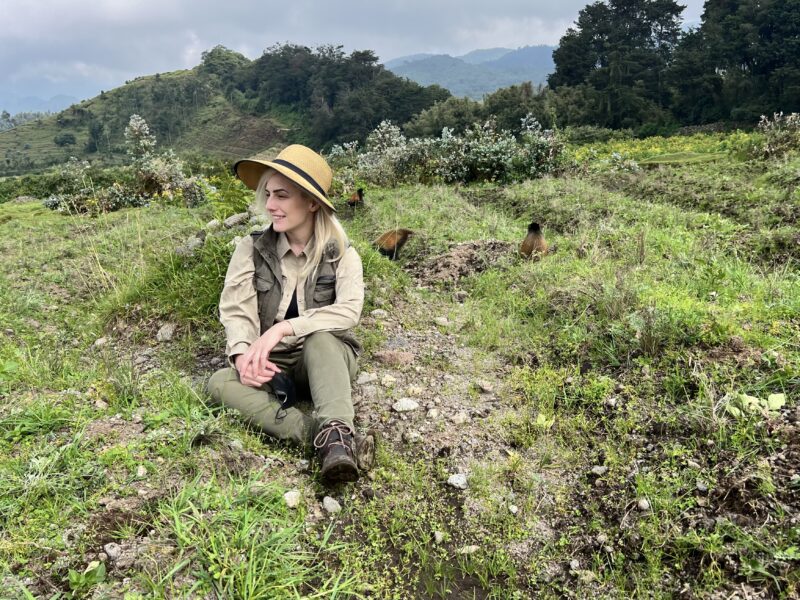
“Safaris are not your typical travel experience, rushing from site to site against the push of tourist traffic,” says Abu Sarah. “Instead, while the tracker reads the landscape and stalks a pride of lions, there is a lot of time for reflection and drinking in the wild beauty of nature.”
She and her husband were “lucky enough to photograph all of the ‘Big 5,’” she says, referring to “lion, leopard, rhino, elephant, and buffalo.” They also encountered “rare sightings of hyena cubs, hippos, genets, and more.”
Abu Sarah admits that there were some “tense moments.” For example, “We spent a long half hour trapped between an aggressive elephant herd and a pride of lions guarding a kill they downed at a watering hole.”
She was impressed by the skills of the “excellent Maasai tracker” who accompanied them. Among his many feats were “tracking a cheetah and her cubs” and “finding my husband’s cell phone in an open savanna grassland.”
That phone had been balanced on the rail of the Jeep to take a photo and then forgotten when the journey was resumed. Finding it an hour later was an amazing accomplishment.
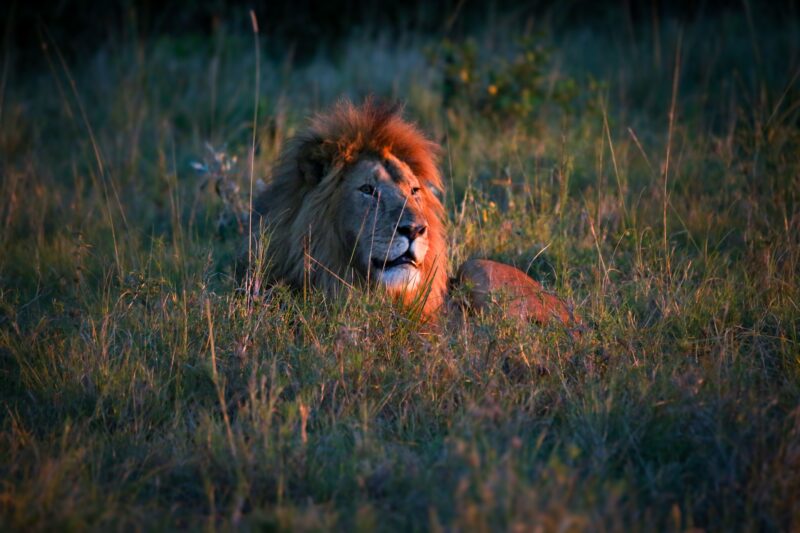
The young professor kept the International Studies program in mind during her overseas journey. “The month in Africa provided great opportunities for expanding the program as we build more global connections,” she says.
In Nairobi, Kenya, for example, she developed contacts with Nai Nami (“Nairobi with Me”), an organization offering support for children and youth in Mathare, the second largest slum in Nairobi.
“Nai Nami teaches public speaking and career skills to former street kids, many just coming out of prison,” Abu Sarah explains. “This start-up in Kenya is a great example of a social enterprise, or business with a dual bottom line—DBL.” Such enterprises, which generate profit and support a social mission, show how “Africa’s rising generation of young entrepreneurs is making an impact.”
In Rwanda, Abu Sarah and her husband stayed with National Geographic Explorer Ari Beser, grandson of the radar technician who was aboard the Enola Gay when it dropped the bomb on Hiroshima in 1945. Beser is making a film called Generation Rwanda about the country’s post-genocide generation, including college students whose efforts Abu Sarah admires. “I’ve studied the 1994 genocide,” she says, but her visit to Rwanda “highlighted how college students there are driving recovery, growth, and development.”

Beser, their host, introduced the couple to “young visionaries like Michael Makembe, who is on the cutting edge of the Kinyatrap and Afrobeat movements.” Abu Sarah appreciates Makembe’s musical creativity, his efforts “to celebrate and preserve Rwanda’s heritage of traditional music,” and his fusion of “modern and traditional beats into unique soundscapes.” She calls Makembe’s work “a beautiful example of how embracing both tradition and innovation opens a horizon of exciting new possibilities,” and says, “As a professor, that fusion of tradition and innovation is how I’ve always imagined the calling of Erskine College.”
While in Tanzania, Abu Sarah traveled to Dar es Salaam, the largest city in Tanzania and in all of East Africa, with a population of more than five million. She also visited the spice island of Zanzibar in the Indian Ocean. Now part of the country of Tanzania, Zanzibar “felt wonderfully familiar,” she says. “The Islamic sultanate that used to rule the island also ruled Oman, where I worked in the 2010’s. Both areas benefited from the spice trade and from wonderfully rich Indian Ocean exchanges.”
This semester, Abu Sarah is incorporating elements of what she learned on her trip to Africa and on previous journeys abroad into her teaching. “Bringing my travel experiences into the classroom helps me inspire students to appreciate global cultures, embrace change and exchange, and seek creative solutions to complex problems,” she explains.
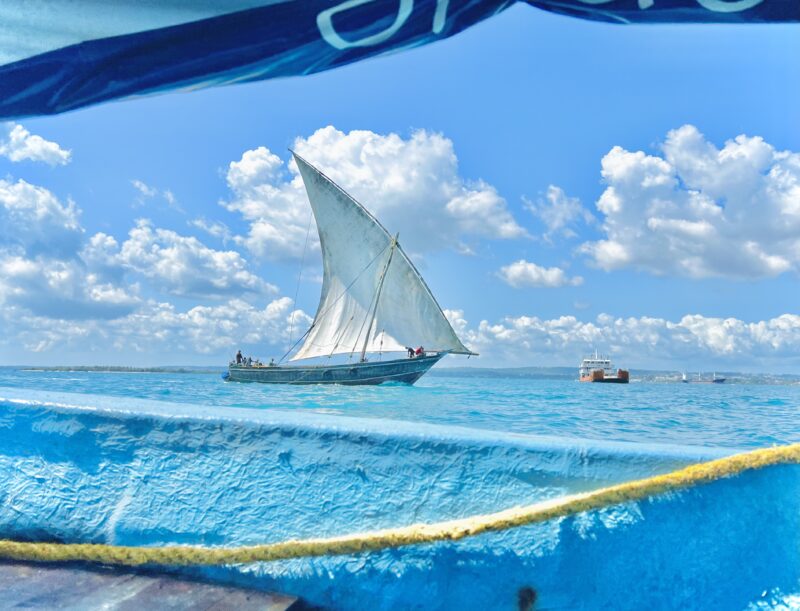
In her Conflict Management course, “students are learning about the kola nut’s role in both Yoruban reconcilation rituals and the global spice trade,” she says, the latter role linked to the kola nut’s use as an ingredient in the original formula for Coca-Cola. In the same class, Abu Sarah highlights “how careers in crisis prevention intersect with global healthcare, environmental studies, and law.” She offers an example from her recent month in Africa.
“In June, when we hiked along the border between Rwanda and the Democratic Republic of the Congo (DRC), we watched game wardens with N95 face masks and machine guns who were protecting roving troops of golden monkeys,” she recalls. “The monkeys come down from the Virunga volcanoes to feast in farmers’ fields, so the Rwandan government runs a crop reimbursement program to prevent human-wildlife conflict, limit zoonotic disease transmission, and protect the endangered species.”
Abu Sarah cites another example from her recent trip, one which demonstrates how challenging conflict management can be, especially in the context of multiple conflicting interests. “In South Africa, we visited multiple reserves in Mpumalanga and in the Eastern and Western Cape,” she says. “There, poaching and rhino conservation are entangled with native land claims, the country’s history of apartheid, and transborder refugee flows from Mozambique, Zambia, and the DRC. Learning about these issues gives you an appreciation for the complex interdependencies that conflict specialists must address in order to resolve problems.”
Enthusiastic about the growth of International Studies at Erskine, Abu Sarah says of the fifteen students majoring in this new program, “Spending time with them is energizing! The International Studies students are passionate about travel and exploration; they love to laugh and try new things, and they live life to the full.” She notes that some of them are planning to study abroad in Scotland, “and there’s discussion about a trip to Vietnam in the spring.”
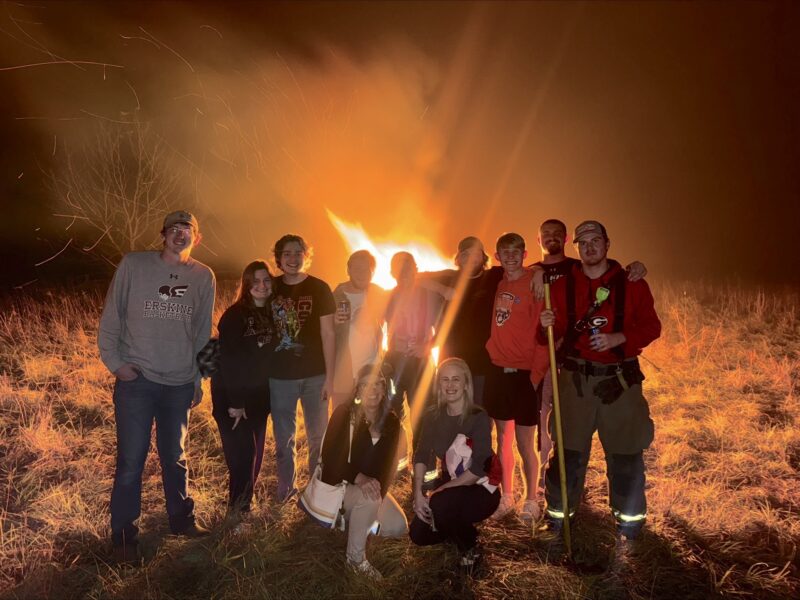
Meanwhile, Abu Sarah says, “This fall semester, our big event [was] ‘Remember, remember the 5th of November.'” The date she refers to is Guy Fawkes Day, which commemorates the 17th-century “Gunpowder Plot” in England. This year’s Guy Fawkes Day gathering of International Studies majors and guests took place off campus and featured a bonfire and fireworks. “We had a great turnout of students and a good fireworks show,” says junior Sloan Bradley, an International Studies major. Several students spoke at the event.
Learn more about Dr. Abu Sarah here and here.
Shown at top of page is Dr. Abu Sarah in Kenya.
Photos taken in Africa courtesy of Dr. Abu Sarah; Guy Fawkes Day photo contributed by Sloan Bradley.
